Three Taiwan Metal and Glass Furniture Makers Weather Rough Going
2008/10/08 | By Steve ChuangFurniture makers in China and Vietnam, generally resorting to underselling as more a survival strategy than sensible business decision, have been forcing the hands of rivals in Taiwan to be creative to fend off price-cutting. Specifically the makers of metal and glass furniture have fought off the temptation to migrate offshore, as many peers have done to take advantage of low labor costs in SE Asia nations, instead they have stayed in Taiwan to make the most of the readily accessible, and long-developed downstream supply chain on the island. Such steadfast attempt has over the years successfully helped these glass and metal furniture makers build a solid reputation among global customers, as well as becoming the pride of the furniture making industry.
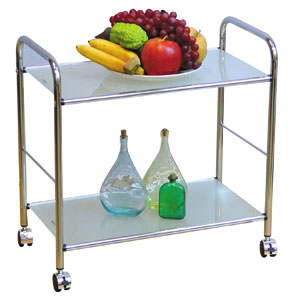
For about 50 years, the furniture sector in Taiwan has been a key export driver, which underwent a golden age a few decades ago. But such prosperity could not continue without being interrupted by gradually developing emerging economies, which have been dumping to win market shares, with the makers in Taiwan moving the production of mainly low-end, wooden furniture offshore for cost efficiency.
The metal furniture sector in Taiwan has been a bellwether mainly backed by a stable supply of quality, high-grade metal stock, highly-developed metalworking skills and advanced automation. The sector exported a total of US$420 million of products in 1989, a figure that grew to US$779.49 million in 1992, becoming the largest contributor to furniture exports out of Taiwan.
Official Help on the Way
Despite prolonged industrial recession in Taiwan over the past few decades, furniture suppliers in Taiwan still exported US$400 million of goods in 2005 and US$380 million in 2007. Seeing the considerable potential in the sector in Taiwan, the MOEA (Ministry of Economic Affairs) is helping insiders with officially-subsidized projects, aiming to help bring the production value of the sector to NT$25 billion (US$794 million at US$1: NT$31.5) by 2012.
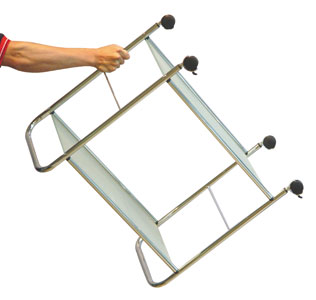
Long Established Sector
Another sector that has survived even longer than the metal furniture sector in Taiwan is the glassmaking sector, which goes back about a century, hence boasting very mature production technologies that have helped the sector in Taiwan to turn out a wide range of innovative glass, which are used to produce decorative glass items, as glazing, and glass furniture.
In 2005, several Taiwan-based glass and furniture companies decided to integrate resources to their advantage-pooling skills and experience to create both glass furniture and related glass applications-by forming the TTG (Team Taiwan Glass) in 2007, which has participated in numerous globally famous furniture trade fairs to successfully attract attention among foreign buyers.
Jackson Lin, president of TMG Enterprise Ltd. and chief founder of the TTG, says that the trade association has 66 members, who agree to integrate skills to produce and create glass furniture, and more importantly working towards the common goal of promoting TTG-branded, Taiwan-made glass furniture worldwide.
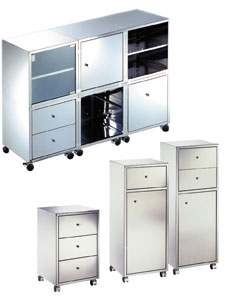
The teamwork so far has paid off, with the TTG winning sizable orders for glass furniture from IKEA, the world's largest K/D (knockdown) and DIY (do-it-yourself) furnishings distributor.
Functionally-oriented K/D Furniture Maker
Kadeya Enterprise Co., Ltd., founded in 1993 in Changhua County, central Taiwan, has been a dedicated ODM supplier of high-end K/D furniture.
The company makes the most of its versatility-mixing various plastics as PP (polypropylene), zinc and aluminum alloy, glass and wood to turn out a wide-ranging line of combination metal furniture. Its current lineup includes tables, PC tables, display shelves and chairs, all of which are exported: 80% to Japan and 20% to the U.S. and Europe.
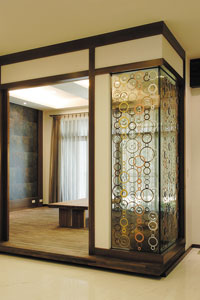
The popularity of Kadeya's K/D furniture in Japan, whose buyers are known for being quality-sensitive, attests to its commitment to high quality. J.Y. Lay, president of Kadeya, says: "Japanese clients would first visit our plant to make sure we are qualified in terms of production capability and capacity before ordering. In short we have to be at our best to become a supplier for Japanese clients."
However, Kadeya's success is due to effectively tapping both its dedication to quality and R&D. Lay takes pride in being able to develop high-end furniture that intelligently realizes form and function: in short, creating pieces featuring two or more types of materials to show optimal aesthetic and functional effect.
Engineered Structure
One of the company's noteworthy items is a conference table of metal tubing, which features engineered simplicity: its patented rabbet joint enables users to assemble the table with no more than four screws. Such smart structural engineering, compared to others needing more fasteners that are less sturdy in the long-term, makes Kadeya's design far more preferable in terms of durability and innovativeness.
Another innovative item is the new KDY 5070 series cart featuring stainless steel frame and two glass trays. The company uses, instead of conventional fasteners, patented, star-shaped plastic plugs that tightly inserts into the metal structural tubes, making for easy DIY assembly that is solid.

Without consciously engaging in R&D, Lay believes, that suppliers in the line may be overwhelmed by globalization as technology transfers are inevitable and will help those who care to improve to succeed, adding, "Kadeya is proving being conscientious is working to pave the road to success."
Smart Design
Another ODM maker specializing in K/D metal furniture is Chang Fu Precision Co., Ltd., who was established in 1995 in Changhwa County, central Taiwan.
Starting as an OEM supplier of metalworking services, Chang Fu diversified in 1999 into manufacturing K/D metal cabinets and racks, which are all of stainless steel and mainly for bathrooms. So far, the company has developed various mid and high-end K/D cabinets on the ODM basis, effectively tapping the British, German and Japanese markets.
Jane Wu, sales manager, says that the company has a gift for designing K/D furniture with improved structure and eye-catching exterior. Easy assembly is the key feature: For example, Chang Fu's storage box fully shows the company's effort in intelligent engineering, enabling sub-one-minute assembly without any fasteners.
Besides, the box features modular design and colorful exterior, Wu says, "such feature enables users to expand as necessary." Also, this storage box is available in many colors and very well-received in Japan, partly due to its multi-functionality as both furniture and ornament.
Wu adds that Chang Fu turns out K/D furniture without welding to achieve flawless, shiny surfaces, and that different colored furniture will be introduced to meet various demands in overseas markets. "Generally, Japanese consumers prefer warm colors and Europeans tend toward cold hues," she says.
Wu says that Chang Fu will keep developing new cabinets to meet global demands, and will try to prospect for new foreign accounts on its own. "Chang Fu is competitive for its experience and mature technologies," she says.
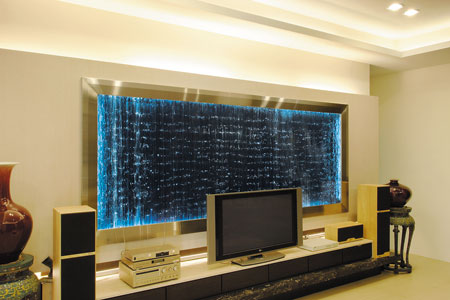
Consultant and Supplier
Yen-Chief Artistic Glass Co., Ltd., established in 1989 in Tainan City, southern Taiwan, is a 20-year glass and glass furniture supplier, whose professionalism and R&D capability make it one of the most influential members of TTG.
Yen-Chief capably handles hot work (processing glass at comparatively high temperatures of between 450 and 1,450 C) and cold work (processing at room temperature), and has a fully-integrated, in-house production line that handles design, sand casting, core forming, lampworking, blowing, fusing, slumping, sand blasting, grinding, printing, gluing, polishing to engraving. Such production capability enables the company to achieve a high degree of product variety.
The company is noteworthy for its personalized, user-friendly ODM services: taking into consideration user's jobs, hobbies and age bracket when designing new glass. For example, Yen-Chief designed, especially for the celebrated Yankees pitcher from Taiwan Chien-ming Wang, a sculptural, thematic glass wall featuring embedded glass baseballs, says G.W. Li, sales manager.
Effective Communication
"Making sure of customer's particular needs through effective communication, we can develop new, innovative glass furnishings to fully achieve customer satisfaction," Li says. "In fact, Yen-Chief is not more than a glass furniture manufacturer, but also a consultant in Taiwan."
Having accumulated ample ODM experience, the company plans to develop a private brand and is about to launch a series of standardized glass items that conform to SGS standards to be eco-friendly, which will be sold under its own brand globally. Li says that the standardized lineup will be available in a variety of sizes or styles, perfect for interior design applications. Also, the company has been working with a foreign designer in North America to produce glass doors, showing its ambition to go global.
Furthermore, the company is offering online help by posting on its website shop drawings and CAD (computer aided design), enabling professionals and customers with referencing, interior design tasks. "Such online information could be both a B2B service for interior designers or e-shopping for customers," Li says. "Plus it serves a very practical purpose by allowing buyers and designers to see, try our innovations immediately, conveniently before placing orders."




